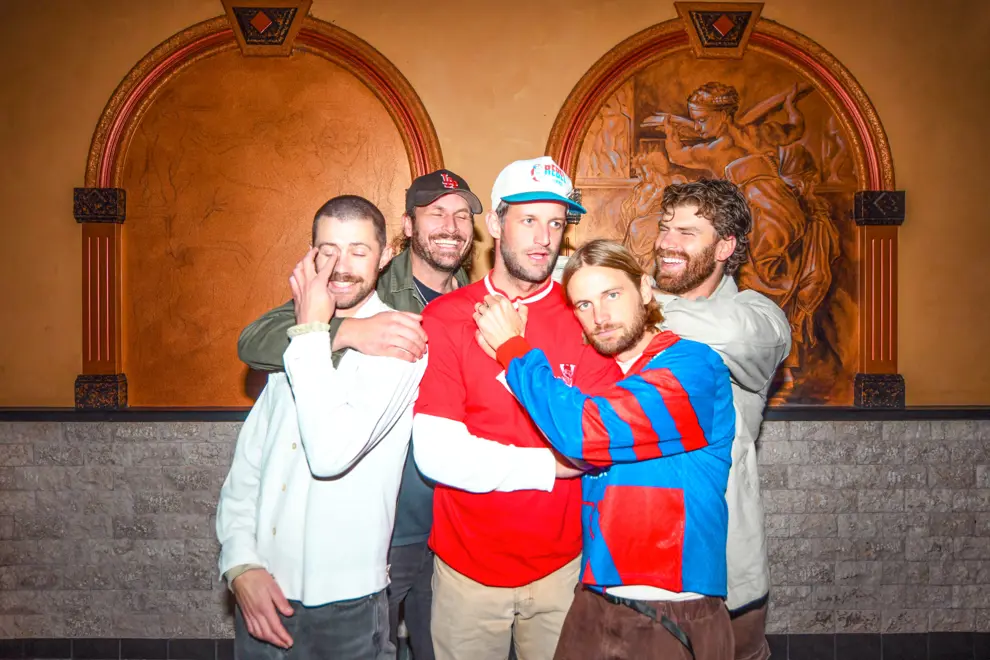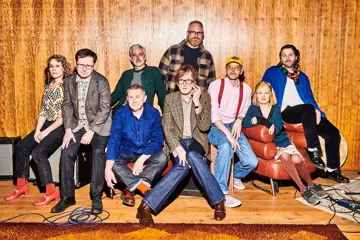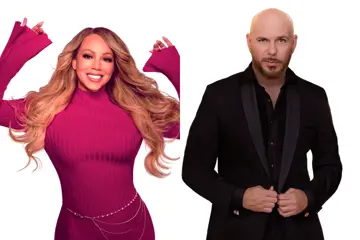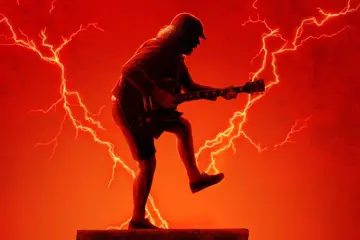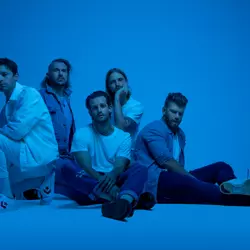 The Rubens
The Rubens“We do love a bubbly”, The Rubens leader singer Sam Margin freely admits when discussing the title of their new album SODA. To his credit, both he and his brother, Elliott Margin, have proof. They have, in fact, each been knocking back a bottle of soda since the interview began. “It’s funny. It has nothing to do with the record, but us Margin brothers only drink soda water, which is so funny.”
Dialling in from “Near Wollongong,” Sam and Elliott, 2/5ths of The Rubens, are deep into promotional duties for their new album, SODA, released today. When The Music catches up with the brothers, they’re a clear confluence of excitement and relief.
“Obviously, we’ve had this thing recorded for quite a while, so we’re just keen for people to hear all the songs they haven’t heard so far,” Sam keenly utters.
The Rubens, which consists of Sam on vocal duties, Elliott on keys, their brother Izaac Margin on lead guitar, Scott Baldwin on drums and William Zeglis on bass guitar, have been doing this for quite a while now.
Formed in 2011, they clearly never anticipated to come this far with their music. After early success, the boys were launched into another level of popularity through their 2015 tune, Hoops. It dominated the ears of most young Australians the entire year until it eventually won the coveted #1 spot on the triple j Hottest 100.
Given all this success, you might think that The Rubens would have a slight ego. This could not be further from the truth. Still sort of bemused by their success, the boys have a very modest, grounded Australian way of talking about their music.
“We wanted [the title] to be a track that was exciting to us, and we all loved SODA. I think it’s our favourite track off the record,” Sam offers. “We also loved the aesthetic because it’s a very bold word.”
The sound of SODA is also seemingly a departure from the Rubens's past work. Speaking on this, Sam explained, “I think if you really look at the elements in that song, there’s nothing that wild in it compared to a lot of other music we’ve released in the past. There are guitars, there’s big bombastic drums. Obviously, that synth hook at the start is not the craziest thing we’ve ever done. The autotune I think threw people off.”
As it happens, the autotune elements came about as a result of their work with acclaimed producer Konstantin ‘Kon’ Kersting.
“It was a choice that was made by Kon,” Sam explained. “He was like ‘It could sound cool with heavy autotune’. Then he sent it back, and it complimented the songs. It made it darker and more ominous. And it’s thrown people, but I like that. Really, we just write what we write, and if we like it, we put it on an album.”
Marking another significant feat in SODA, the band have also crafted a love song for drug dealers—a first, at least to my ears. “I had this melody that sounded like a love song. All sentimental and sappy,” Elliott explained. “It would have been too easy to do another love song. So, then I thought up the story of your drug dealer breaking up with you. That felt like striking gold”.
Describing the recording experience as “easy and casual,” Elliott noted that this was a marked change from previous records. “We’d be in the studio for 12 hours straight for two months at a time. The strain would be taxing and wouldn’t benefit the music. Because you get drained. We’d work at the studio in the Bunker”.
As Elliott tells me, the Bunker is an old World War II communications bunker in Camden, NSW, that Zeglis rents out to make their music. Effectively, it is now the birthplace of The Rubens’ current music.
SODA also marks a slight change in the band’s overall aesthetic, too. However, as they tell me, they aren’t quite as involved in this side as they are in the music. Often delegating creative responsibilities to people they can trust, overall, the five-piece tend to keep it close.
“The artwork is by Giulia McGauran, who is now Zach’s [Margin] wife, our sister-in-law,” Elliott adds. “Same thing when we work with Kon. When you’re collaborating with someone, the biggest barrier is often getting what’s in your head across to someone else. With these people, we have a shorthand.”
“Even if you don’t have a specific direction, they’ll be able to go out there and make something that’s going to suit you,” adds Sam. A dynamic which, as they tell me, works perfectly for them.
Over time, the band has also been afforded greater creative freedom by their label. This, as Sam tells me, has come about due to them “proving themselves.” This proof largely came within Hoops and several of their follow-ups, including Live In Life and Never Ever (feat. Sarah).
“It changed our lives,” Sam admits when discussing the legacy of Hoops. “We were so happy and excited when that song won Hottest 100.” As with all the things that come with tasting large-scale success, the band got a taste of real fame, if only for a bit.
“I remember being famous for about a week after Hoops came out,” Sam adds. “I remember I couldn’t go into General Pants Co. because it would just be annoying.” “It’s already annoying in there anyway,” interjects Elliott.
Given that it’s nearly been ten years since Hoops's stratospheric success, I wonder whether the band sometimes feels the pressure to follow up the song with another smash hit.
“Nope,” Sam marks bluntly. “I’m also very surprised we didn’t try that. But I’m proud of us for not. All we want is to continue doing to do this for a living. The real pressure now is just having fans to continue to come see shows. And right now, it’s working.”
The Rubens’ new album, SODA, is out now—you can buy the album here. The Rubens will also be performing nationally from September 20 to November 23. Tickets are available here.

